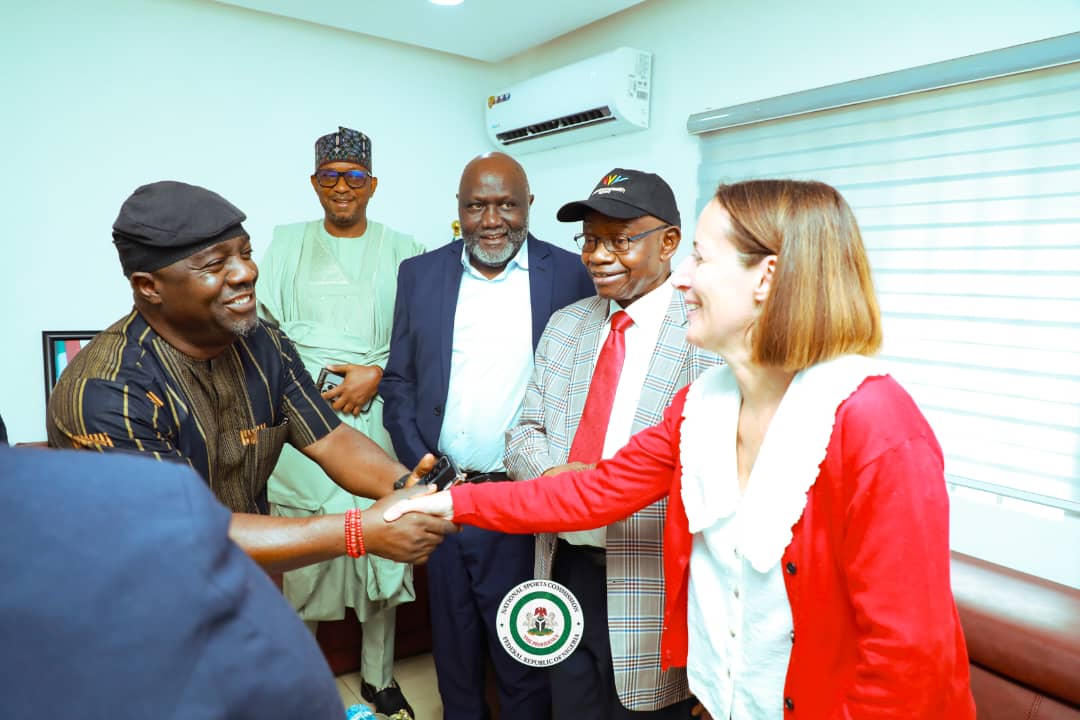Featured
Naija Ratels President, Barr. Paul Edeh Visits New NWFL Secretariat

….Donates Photocopier-Printer, Match-Balls Others
…. Advocates For More Teams in the NWFL.
The president of the Nigeria Women Football League side, Naija Ratels FC, Barrister Paul Edeh on Wednesday visited the new NWFL Secretariat which is under renovation, where he paid a courtesy visit to the newly appointed Chief Operating Officer of the league, Mrs. Faith Ben-Anuge. The Naija Ratel boss also took advantage of the visit to donate a digital multi-functional copier, an embossed number clock, and twenty match balls to the NWFL.

The visit was primarily to congratulate Mrs Faith Ben-Anuge over her appointment by the NFF and seemed to touch on some critical issues on the growth and development of the league as well as seek for collaboration with the league body on the annual Naija-Ratels Pre-season Championship.
The Ratels President in his remarks said he deemed it necessary to pay the new Chief Operating Officer of the league a visit because the team enjoyed a very robust relationship with the former C.O.O, Dr Ayo Abdulrahman and thought the good tidings should continue considering the dynamism she was bringing to bear on the league.


” We have no doubt, that with your pedigree and dynamic leadership, having been around the women’s football cycle for some time now, your unique touch will boost the work of your predecessor. We are sure that you would get the job done diligently with the full backing of your boss, the Chairperson of the NWFL Ms. Aisha Falode.” He noted.
“Over the years, we have had to contend with the women’s league playing second fiddle to the men’s league.
” There is so much disparity when you compare the wages of the male footballers to female footballers both at the league level and at the level of the National Team.
” I urge you to use your good office as Chief Operating Officer to advocate for equal pay for both the men’s and women’s league. This I think is achievable considering the fact that some state-owned teams are already paying the same wages for both their male and female teams.

“No doubt, the NWFL Chairperson, Aisha Falode has introduced a lot of innovations and discipline into the league, she has succeeded in making the NWFL a huge success as she isn’t one who would bend laid down rules. She operates by the books as she thinks outside the box.
The Benue-born philanthropist went on to say that there is a need for the expansion of all tiers of the Nigeria Women Football League if there must be an improvement in female football in Nigeria.
” The expansion of the various tiers in the NWFL is also very necessary. It is not enough to advocate for equal pay, it is also important to emphasize that the male and female league should have more teams participating that that of the male league.
He noted further that “The NPFL has 20 teams, while the NWFL Premiership has 16 teams, the NNL has over 40 teams, while the NWFL Championship as at last year had only 5 teams, the NWFL Nationwide, which is meant to be the grassroots league had just 6 teams as at last year, while the NLO has over 300 teams.
” It is our responsibility to make grassroots football more attractive, as it is the bedrock of our football. Our vision as a club is to discover talents and bring them to the limelight.
“We have a great structure as a club and our clubhouse in Makurdi covers a landmass of 2000sqm and it is tastefully well furnished.
” I am glad to also announce that most of our players are on scholarship because we believe education must go together with football, while those who are not opportune to go to school are engaged in vocational training. Our recent enrollment of our girls in vocation training cost an upwards of 1.8M Naira in its first phase.
” I want to use this medium to solicit for collaboration with the NWFL to partner with Naija Ratels FC to host the Naija Ratels Pre-Season Tournament which will enable teams to test their players before the league fully takes off.
” The Naija Ratels Pre-season Championship is the biggest Pre-season tournament in Nigeria and it’s necessary that we form a partnership with the NWFL to make it even more robust.
” We look forward to having a bigger and better Pre-season Championship this year and we know with the support of the NWFL, we shall achieve our aims. “
Finally, the legal luminary cum football administrator while making a donation of a digital multi-functional Sharp Photocopier and Printer, embossed number clock, and twenty match balls to the NWFL Secretariat, stated that the urge to ensure a smooth and functional environment for the NWFL inspired him on the donation of the office equipment.
The Chief Operating Officer of the NWFL, Mrs Ben-Anuge, while receiving the donated equipment, described the donor, Bar. Paul Edeh as a women’s football patriot and one who has shown selflessness to the development of the league.
” We would like to express our very sincere gratitude to Bar. Paul Edeh for his contribution to the development of women’s football in the country.
” The Photocopier, Printer will indeed help to ease our official duties here at the NWFL Secretariat.
” Just like you rightly said, the chairperson of the league, Aisha Falode has done a lot to see our league become one of the best in the world. Last season, she single-handedly went all out to get sponsors for the league. We are looking forward to getting sponsorship for the league and call on corporate organizations and individuals to come forward and assist the league to grow. She said.
” Your proposal to partner with the NWFL is a welcome development and I will present your proposal to the Board and I have no doubt that the board will be favorably disposed to partner with you to host the Pre-Season Tournament. It may be necessary to consider hosting this edition in Abuja to encourage participation.”
“I hope someday, the Nigeria Football Federation sees a treasure in you and bring you to the glasshouse, where you can exhibit your wealth of experience. She concluded.
Also speaking, a board member of the NWFL, Mr. Joe Amene, who was present at the event, said the level of women’s football in Nigeria and indeed Africa has improved drastically, citing the introduction of the CAF Women’s Champions League as a leapfrog to success.
Mr. Amene also hailed Aisha Falode for the steady leadership in the NWFL, since she came in three years ago.
The experienced football administrator while thanking the President of Naija Ratels FC, Barrister Paul Edeh for his generosity also praised him for laying down good examples for other clubs in the NWFL to follow.
The C.O.O. took the Naija Ratels round the new NWFL office complex located in the former NFF Headquarters where he inspected the ongoing renovation of the office complex.
Featured
Nigeria’s Historic Bid for the 2030 Commonwealth Games: A Call for National and Global Support

Joel Ajayi
Nigeria is poised to make history as it seeks to host the Centenary Commonwealth Games in 2030, a monumental opportunity that promises to transform the nation’s economy, infrastructure, and global standing.
More than a sporting spectacle, the Games would serve as a catalyst for development across multiple sectors, leaving behind a legacy of national pride and sustainable growth.
The benefits of hosting the Games extend far beyond the sports arena. Nigeria stands to gain both empirical and non-empirical advantages, with direct, indirect, and induced impacts that will touch every corner of society. Infrastructural development will take center stage, with new facilities such as indoor sports halls, conference centers, and improved road networks reshaping urban landscapes while strengthening the nation’s capacity to host future international events.
Economic growth is another significant dividend. Over 10,000 jobs are expected to be created, spanning construction, facility management, event planning, and tourism services.
The hospitality industry will undergo major improvements as hotels and resorts are upgraded to meet international standards, while local restaurants, lounges, and tourist attractions will see a surge in patronage from international visitors. Small and medium enterprises, particularly in the transport, finance, and food service sectors, will become some of the greatest beneficiaries, as the Games generate new demand and expand opportunities for local businesses.
The Commonwealth Games will also accelerate the growth of Nigeria’s sports industry.
Investments in training facilities, coaching, and talent development will inspire a new generation of athletes, ensuring long-term benefits that extend beyond 2030, a major focus of the President Bola Tinubu administration.
At the same time, the process of preparing for the Games will create opportunities for Nigerians to learn new crafts, acquire technical skills, and engage in global-standard event management, thereby strengthening human capacity and innovation across industries.
Mallam Shehu Dikko, Chairman of the Nigeria Sports Commission, and Hon. Bukola Olopade, the Director General, have been widely recognized for their tireless and visionary leadership in repositioning Nigeria’s sporting sector.
Their commitment to facilitating infrastructural development and strengthening grassroots sports development has laid the foundation for Nigeria’s bold bid to host the 2030 Commonwealth Games. Under their leadership, the NSC is fostering strategic partnerships and driving innovation in sports administration, they have demonstrated the nation’s readiness to stage an event of such global magnitude.
Beyond the tangible gains, the hosting of the 2030 Commonwealth Games carries profound symbolic value. It would be a moment of unity and pride, a chance for Nigeria to showcase its cultural richness, resilience, and excellence to the world.
As a centenary edition, the Games would stand as a historic milestone not just for the Commonwealth but for Nigeria itself, cementing its place on the global stage as a capable, ambitious, and forward-looking nation.
The gains from hosting the Commonwealth Games can never be undermined or overemphasized. This is Nigeria’s time to step forward and show the world our resilience, and excellence. We call on every Nigerian, across sectors and communities, to support this noble aspiration.
Nigeria’s pursuit of the 2030 Commonwealth Games is a vision for transformation, a blueprint for national development, and a legacy project that will inspire generations to come.
-

 Featured6 years ago
Featured6 years agoLampard Names New Chelsea Manager
-

 Featured5 years ago
Featured5 years agoFG To Extends Lockdown In FCT, Lagos Ogun states For 7days
-

 Featured6 years ago
Featured6 years agoChildren Custody: Court Adjourns Mike Ezuruonye, Wife’s Case To April 7
-

 Featured6 years ago
Featured6 years agoNYSC Dismisses Report Of DG’s Plan To Islamize Benue Orientation Camp
-

 Featured4 years ago
Featured4 years agoTransfer Saga: How Mikel Obi Refused to compensate me After I Linked Him Worth $4m Deal In Kuwait SC – Okafor
-
Sports3 years ago
TINUBU LAMBAST DELE MOMODU
-

 News9 months ago
News9 months agoZulu to Super Eagles B team, President Tinubu is happy with you
-
Featured6 years ago
Board urges FG to establish one-stop rehabilitation centres in 6 geopolitical zones
